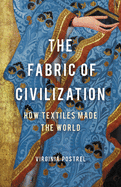
In The Fabric of Civilization: How Textiles Made the World, Virginia Postrel (The Power of Glamor) convincingly argues that textiles have played a central role in the histories of technology, commerce and civilization itself.
The Fabric of Civilization is a story of innovation--or, more accurately, a series of stories. Postrel describes innovations in the creation of textiles, from the game-changing discovery of string in the Stone Age to current efforts to engineer "smart textiles." She explains the fundamental principles of spinning and weaving, and the unexpected relationship between weaving and binary code. She considers how changes in textile manufacturing shaped the larger world, including the textile mills that sparked the Industrial Revolution and the search for better dyes that created the modern chemical industry. Furthermore, she looks at the development of information technologies as a result of long-distance textile trades: business letters in ancient Assyria, regular mail service in medieval Italy, double-entry bookkeeping in Renaissance Italy, the roots of modern banking in the need for international credit arrangements in the early modern era.
Postrel never loses sight of the people in her story. A woman weaver in ancient Assyria responding to changing market demands, the teenaged Niccolo Machiavelli mastering the "new math" of Hindu-Arabic numerals, paleoanthropologists reproducing prehistoric fibers, and modern textile chemists and engineers all play a role.
Combining exhaustive research with an accessible writing style, The Fabric of Civilization will appeal to both fans of micro-histories and to textile junkies interested in the history of their passion. --Pamela Toler, blogging at History in the Margins

